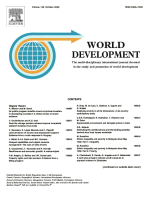
Latecomer development in a “greening” world: introduction to the special issue
Pegels, Anna / Tilman AltenburgExternal Publications (2020)
in: World Development 135, article 105084
DOI: https://doi.org/10.1016/j.worlddev.2020.105084
Volltext/Document
Highlights
• Transformative policies towards a ‘Green Economy’ can bring economic co-benefits, but also trade-offs, for certain economic actors.
• We structure the evidence for latecomer economies along economic arguments for “greening now” vs. “cleaning up later”.
• We find that early greening is likely to bring benefits in terms of competitiveness and gaining a foothold in future markets.
• Delaying action risks irreversible environmental damage, lock-in of polluting socio-technical pathways, and asset stranding.
• The decision between greening now and cleaningup later is not dichotomous, timing and sequencing of policy reforms are key.
The current transgression of ecological boundaries requires a transformation to a ‘Green Economy’, with rigorous and fast reductions of pollution and resource consumption. Transformative policy reforms towards this aim can lead to economic co-benefits, but they can also be costly, at least for certain economic actors. Furthermore, they can involve trade-offs between current and future wellbeing.
Timing and sequencing of reforms is thus far from trivial. More research is needed to inform policymakers in search of the right coping strategies, in particular in economic latecomer countries with persisting poverty and a high need for short-term growth. The main research question of this article is thus: Which economic opportunities arise from orienting economic latecomer strategies towards green technologies and institutions now, versus growing first and cleaning up later?
Literature already provides a fair basis of evidence on this question. However, it is biased towards industrialised countries, and towards a subset of green incentives and technologies, such as carbon pricing and renewable energy support. The aim of this article, therefore, is threefold. First and foremost, we review and structure existing evidence and the new evidence provided by this Special Issue along the economic arguments for “greening now” vs. “cleaning up later”. We thus aim to provide an analytical reference point for the growing body of evidence on economic co-benefits of green transformations, helping to structure the debate, to widen its perspective and encourage further research on emerging aspects. Second, we put this structure in the context of latecomer countries, making the identified issues relevant for their framework conditions and showing where and how the articles assembled in the Special Issue fit in the overall debate. Third, we broaden our assessment to include particularly under-researched areas of green transformations in latecomer countries, such as electric mobility, agriculture, steel, and waste management.
In reviewing the evidence, we find that early greening is likely to bring economic co-benefits, for example in terms of efficiency-induced competitiveness and in gaining a foothold in the markets of the future. Delaying action, in contrast, risks permanent environmental damage, lock-in of polluting socio-technical pathways, and losses from asset stranding. Yet, the decision between “greening now” and “cleaning up later” is not dichotomous. Careful timing and sequencing of green policy reforms are key, and political decision makers can select and design their national policies in ways that turn changing framework conditions into economic opportunities.


